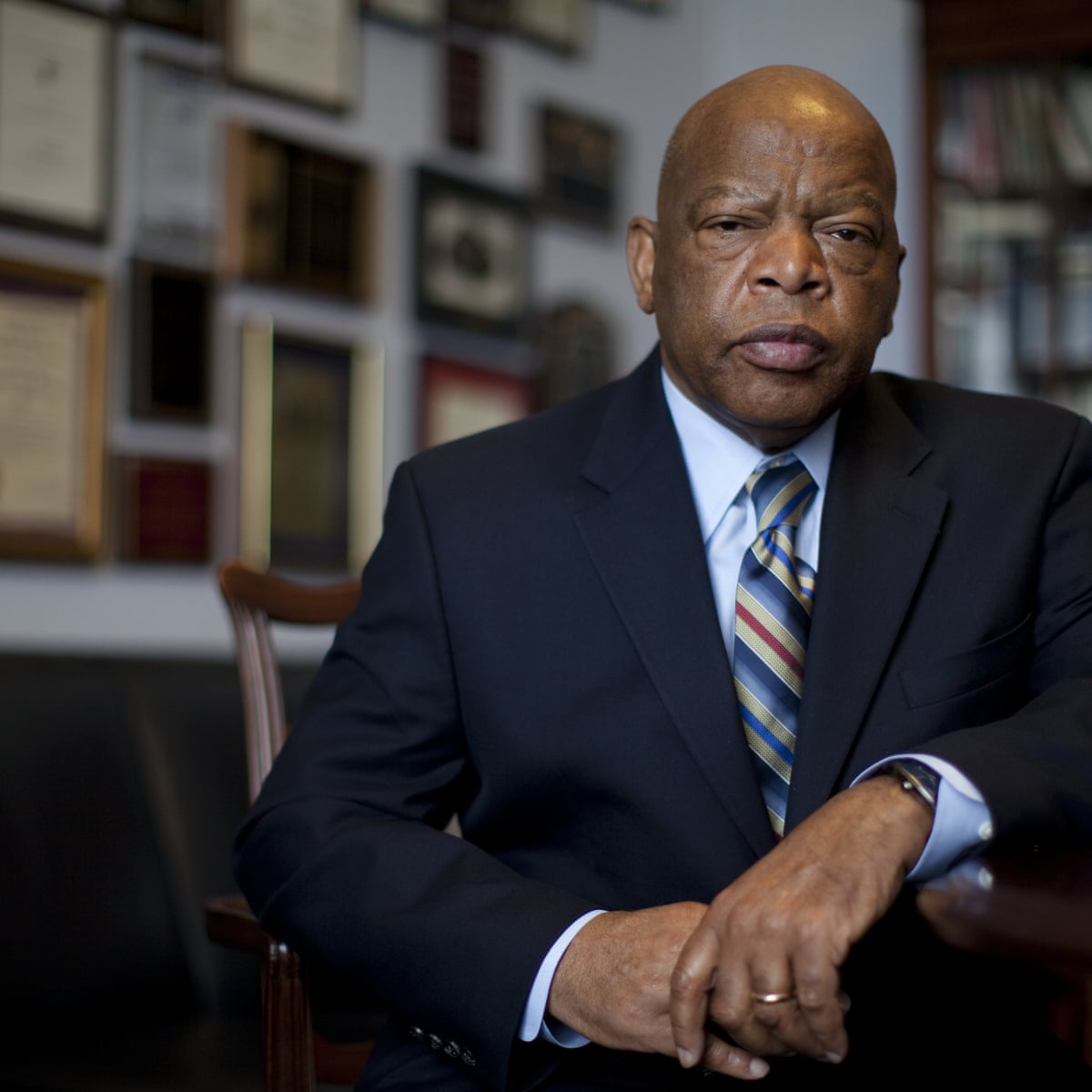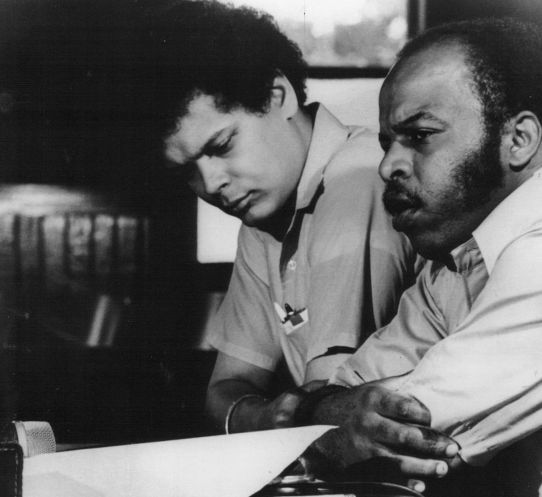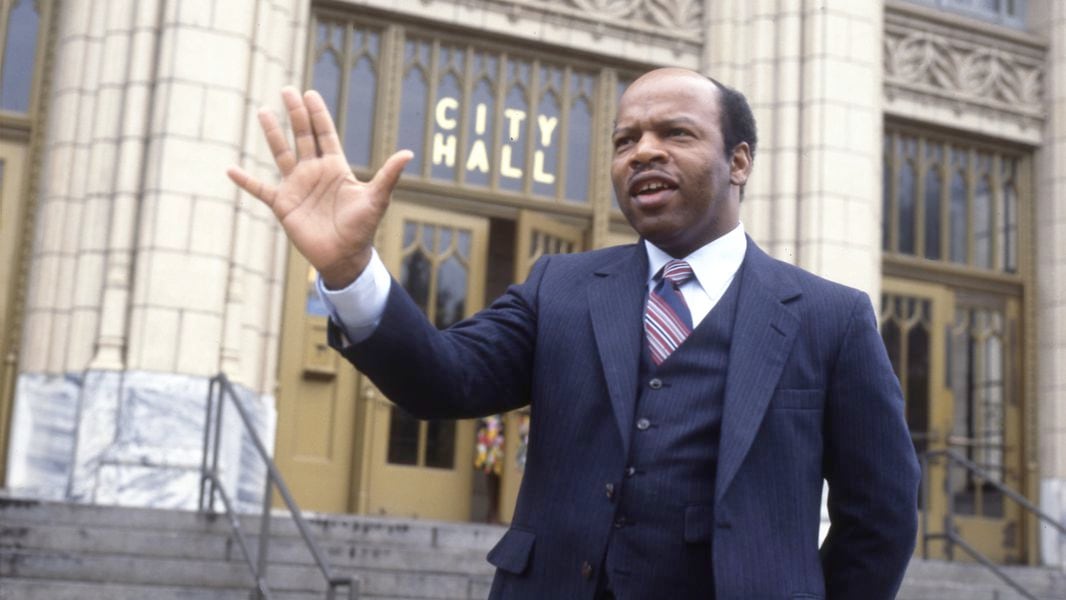 |
| John Lewis 1940-2020 from The Guardian |
John Lewis served over 30 years in the
US House of Representatives representing the Georgia 5th district.
His history as a civil rights leader and victim of a brutal beating while
crossing the Edmund Pettus Bridge during a march for voting rights propelled
Lewis to a status as an icon. His long service in the House, stand for issues of
justice & racial reconciliation, and his willingness to befriend those on
the opposite side of the aisle brought him the reputation as the conscience of Congress.
Less
known was the campaign which won Lewis his long-held seat in Congress which
provided Lewis a national platform and transformed him into figure beloved by
Americans of every ethnicity and political persuasion. Lewis ran for the 5th District seat in 1977 after Andrew Young resigned to serve as President Jimmy Carter’s ambassador to the United Nations but Lewis lost his first bid for
Congress after losing the vote to Wyche Fowler. After a brief service in the
Carter administration, Lewis served six years as an Atlanta city councilor
until Fowler resigned his House seat to run and eventually narrowly win the election
to the US Senate. The campaign for the open 5th District seat
brought Lewis into conflict with another figure who also deserved the label as
an icon of the civil rights movement, Julian Bond, and a campaign long
remembered as a no holds barred political fight.
 |
| Julian Bond & John Lewis from Society of US Intellectual History |
John Lewis and Julian Bond both
emerged into leadership during the Civil Rights Movement in the 1960s and were
both co-founders of the Student Nonviolent Coordinating Committee (SNCC). But
while men shared leadership and friendship during significant elements of civil
rights, their backgrounds and experiences contrasted completely different backgrounds
of being black during Jim Crow segregation. Julian Bond was the son of
historian and university president Horace Mann Bond and Julian Bond enjoyed a
childhood surrounded by academics and exposure to intellectuals in what many
would describe as a life of privilege.
Bond describes his life,
My father got
his Ph.D. from the University of Chicago. He taught at a succession of black
colleges. He was president of Fort Valley State College, president of Lincoln
University in Pennsylvania, dean of education at Atlanta University. [At
Lincoln University,] we had this great big old white house like a Southern
plantation house. In our home were all the great figures of the day. I have a
picture of me sitting on Paul Robeson’s knee while Robeson sings to me. I have
a picture of Albert Einstein. It was just an incredible life for a kid. . . . I
never really knew what a segregated school was until high school. At George
School [a Quaker institution in Pennsylvania], I started dating this white girl
from Virginia. . . . We’d go into Philadelphia on Saturdays or Sundays, then
get back to school around 6 or 7 in the evening. Then one afternoon, the dean
of men called me into his office. . . . He looked like a tennis player or a
country club golf pro who had just begun to age. He told me, in a very calm and
polite voice, that he’d appreciate it if I didn’t wear my school jacket on
those trips to Philadelphia. It was just as though he had slapped me across the
face. All of a sudden, you realize all the talk there’s been, all the
whispering. . . . And also that you’re a Negro. That moment was the first time
I realize realized it—that distance. . . . I simply couldn’t speak anything to
him. I just stood up and walked out of his office.[1]
Bond
remained at the center of civil rights deciding to remain in Atlanta and served
over twenty years in the Georgia General Assembly and became a founder with
Morris Dees of the Southern Poverty Law Center in Montgomery, Alabama. After the election to the Georgia House of Representatives in 1965 Bond and seven other
black representatives faced opposition when white members of the Georgia House
refused to allow them to take their place in the House because of their
opposition to the Vietnam War. The Supreme Court forced the Georgia Assembly to
seat Bond declaring that the House denied him freedom of speech.[2] In
1968, he received a nomination for vice-president of the United States at the
Democratic National Convention in spite of at the age of 28 not meeting the age
requirement. Over time Bond grew adept at legislating eventually becoming the
chair of the Fulton County delegation and sponsored bills assisting poor
Georgians in obtaining home loans. Eventually, his years of effort helped to
create the Fifth District as the first majority-black congressional district in
Georgia, ironically the office he lost to Lewis. The handsome and urbane Bond
represented the future of black leadership and in 1977 when he hosted SaturdayNight Live, Bond presented an image of cool to the nation. Nationwide
appearances and speaking tours hinted at a bright future for Bond as some even
predicted that Bond would even reach the Georgia governor’s office.[3]
 |
| Julian Bond & MLK from The New York Times |
John Lewis as the third child of ten
children of a sharecropping family was in many ways the opposite of Julian
Bond. Lewis experienced not only grinding poverty but the worst of Jim Crow
segregation as a native of Troy, Alabama. By the age of four, Lewis picked
cotton and peanuts just a few miles from the boyhood home of George Wallace.
Discrimination and injustice distressed Lewis,
My father couldn’t afford a newspaper subscription. I’d walk half a
mile to get my grandfather’s paper after he got done reading it. I kept up with
what was going on, reading that paper and listening to that radio. . . . We
ordered everything from the Sears & Roebuck catalog. We called it ‘the Wish
Book.’ . . . I was bused 18 miles to the Pike County Training School. Black
schools were ‘training schools’; whites went to high schools. We had old
broken-down buses, ragged books, a rundown building. White students had new
buses, nice painted buildings with the grounds kept up. . . . In Troy, they had
a soda fountain where you could get Coca-Cola. We called it a combination. A
black person could not take a seat. We had to stand at the end of the counter.
‘May I have a combination?’ You put your money down and went outside to the
street corner to drink it. . . . As a young child I saw a difference. I
resented it. Even the country road where I grew up—because black people owned
the land, the road was left unpaved for many, many years. When it rained, the
bus got stuck in the mud. That was life in Alabama.[4]
Inspired by the Montgomery bus boycott, Lewis
organized sit-in demonstrations while a student at Fisk University and later
became one of the original Freedom Riders. Lewis served as the leader of SNCC in
1963 and adhered strongly to a philosophy of nonviolence and reconciliation
during a tumultuous of confronting the worst evils of racism. Lewis emerged as
one of the important leaders and speakers during the March on Washington. On
March 7, 1965, Lewis endured a beating during the march from Selma to Montgomery
which fractured his skull and left scars he carried the rest of life.
 |
| John Lewis during his time on the Atlanta City Council from the Atlanta Journal-Constitution |
Despite
an old friendship rooted in the civil rights movement, Bond and Lewis faced an
intense and bitter Democratic primary campaign when both entered the race to
replace Wyche Fowler as the representative for the Georgia Fifth district. Because
the 5th district was overwhelmingly Democratic, a win in the primary
was equivalent to victory. Bond was the favorite of the black establishment of
Atlanta and received the important endorsement of Atlanta Mayor Andrew Young
who also formerly served as the representative of the 5th District. At
the time Bond was the greater celebrity and hosted fundraisers featuring
Washington mayor Marion Barry and jazz great Miles Davis. Bond felt entitled to
the seat, “I’d created the seat, drawn the lines myself, I’d made it possible
for a black person to be elected. I wanted badly to be there. I could see
myself there. It seemed natural to me, the next step.[5]”
| State Senator Julian Bond shakes hands with his opponent City councilman John Lewis at a rally in 1986 |
Drug use
became a focus of the campaign when rumors spread that Bond engaged in drug
use. Lewis pounced on the issue and challenged Bond to take a drug test while
Bond accused Lewis of “McCarthyism and demagoguery.”[6]
During a debate, Lewis proclaimed that he passed his urinalysis test and came out
clean but Bond refused to take the test because it “trivializes the issue.[7]”
In black churches, the question arose on whether Bond was a man of faith as his
intellectual personality appeared off-putting to many. But it was the white
population whose mistrust of Bond became decisive in the election. Many of
Atlanta’s white liberal establishment mistrusted Bond and wondered out loud if
he would represent them in Washington. Although Bond was favored, the election
remained tight and Lewis defeated Bond in an upset. From the New York Times,
With all 241 precincts reporting in the unofficial count tonight, Mr.
Lewis had 34,548 votes, 52 percent of the total, to 32,170 votes for Mr. Bond. In
a race that badly strained relations in Atlanta's black community, Mr. Lewis's
margin of victory appeared to come from his strong lead in white precincts on
the city's north side, the last to be tabulated tonight. Mr. Lewis, endorsed by
the Atlanta newspapers and a favorite of the white liberal establishment and
neighborhood organizations, swept the white vote in the first primary, and Mr.
Bond captured the black vote. But in a district whose electorate is 58 percent
black, that division was almost enough to give Mr. Bond a majority. He got 47
percent to Mr. Lewis's 35.[8]
Defeat devastated
Bond and claimed whites cost him the victory he believed he deserved. The bitter campaign destroyed the friendship between
Lewis and Bond who wouldn’t speak to each other until 1989. Bond’s marriage dissolved
into bitter acrimony as his wife Alice publicly accused Bond of drug use although
she later recanted he accusations. After a divorce Bond left Atlanta and
relocated to Washington. He taught at American University and the University of Virginia. In 1998, Bond assumed the chairmanship of the NAACP after a scandal
rocked the organization. But many still felt that Bond never reached his full
potential and that he never really recovered from the defeat in 1986.
Lewis went on
to a storied Congressional career and came to be regarded as an American saint
due to his sacrifice at the Edmund Pettus Bridge and his role as the conscience
of Congress. But in spite of his present revered status, Lewis was still a
politician and his 1986 campaign demonstrated a willingness to engage in the
tough and dirty mud of a tough political campaign. His readiness to build
bridges in the 1986 campaign anticipated a congressional career that crossed
the political divide and work with Republicans even to build friendships with
those he disagreed. His touching tribute to Georgia Republican Senator Johnny Isakson
upon his retirement was just one testimony of the bonds developed by Lewis. But
Lewis also showed a willingness to lead protest when he felt the call and
participated in efforts to remind Congress and Americans of the unfished work
of civil rights. His doggedness led to the creation of the National Museum of African American History and Culture. Lewis served long enough to see BarackObama elected as the nation’s first black president and in 2011 Obama awarded
him the Presidential Medal of Freedom. Upon his death, Lewis became the first black man to have his body lie in state in the Capitol rotunda. And in spite of his many honors and
accomplishments, one must wonder the question of What If? If Bond triumphed in
the congressional election of 1986 might Bond have risen to become the
conscience of Congress and achieve the promise so many predicted in his youth.
 |
| Memorial for John Lewis in the Rotunda |
Sources
Alzuphar, Adolf. "Julian Bond Vs. John Lewis:
An Unforgettable Fight For Atlanta’s Fifth Congressional District." Blavitv:News.
Last modified July 3, 2017. https://blavity.com/julian-bond-vs-john-lewis-an-unforgettable-fight-for-atlantas-fifth-congressional-district?category1=black-history&subCat=community-submitted&category2=community-submitted.
Clendinen, Dudley. "EX-COLLEAGUE UPSETS JULIAN
BOND IN ATLANTA CONGRESSIONAL RUNOFF." New York Times. Last
modified September 3, 1986. https://www.nytimes.com/1986/09/03/us/ex-colleague-upsets-julian-bond-in-atlanta-congressional-runoff.html.
Coppola, Vincent. "The Parable of Julian Bond
& John Lewis." Atlanta Magazine. Last modified March 1, 1990. https://www.atlantamagazine.com/great-reads/the-parable-of-julian-bond-john-lewis/.
Eversley, Melanie. "Voices: Bond's quiet
dignity commanded respect." USA Today. Last modified August 16,
2015. https://www.usatoday.com/story/news/nation/2015/08/16/voices-julian-bond/31819723/.
Hallerman, Tamar. "John Lewis 1940-2020."
The Atlanta Journal-Constitution. Last modified July 2020. https://www.ajc.com/john-lewis-obituary/#chapter-1.
[1]
Vincent Coppola, “The Parable of Julian Bond & John Lewis”, Atlanta
Magazine, March 1, 1990, https://www.atlantamagazine.com/great-reads/the-parable-of-julian-bond-john-lewis/
[2]
Roy Reed,” Julian Bond, Charismatic Civil Rights Leader, Dies at 75,” The New
York Times, Aug 16, 2015
[3]
Copplola, March 1, 1990.
[4]
Coppola, March 1, 1990.
[5]
Coppola
[6] Dudley
Clendinen, “ Ex-Colleague Upsets Julian Bond in Atlanta Congressional Runoff”,
New York Times, Sep 3, 1986, https://www.nytimes.com/1986/09/03/us/ex-colleague-upsets-julian-bond-in-atlanta-congressional-runoff.html
[7]
Clendinen
[8] Clendinen
No comments:
Post a Comment